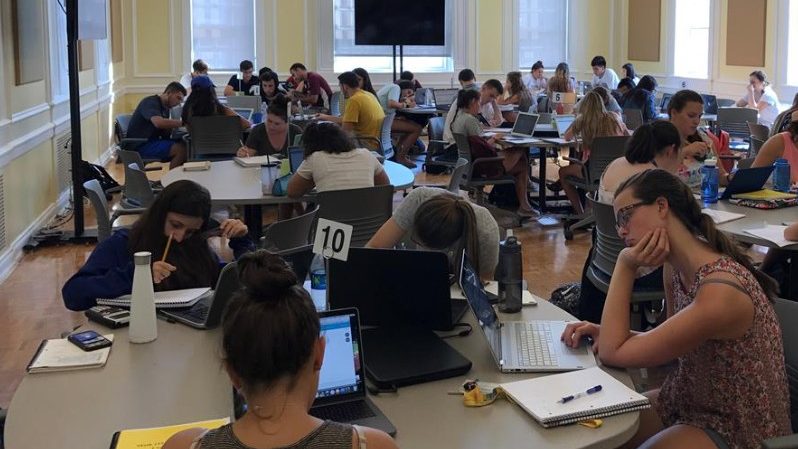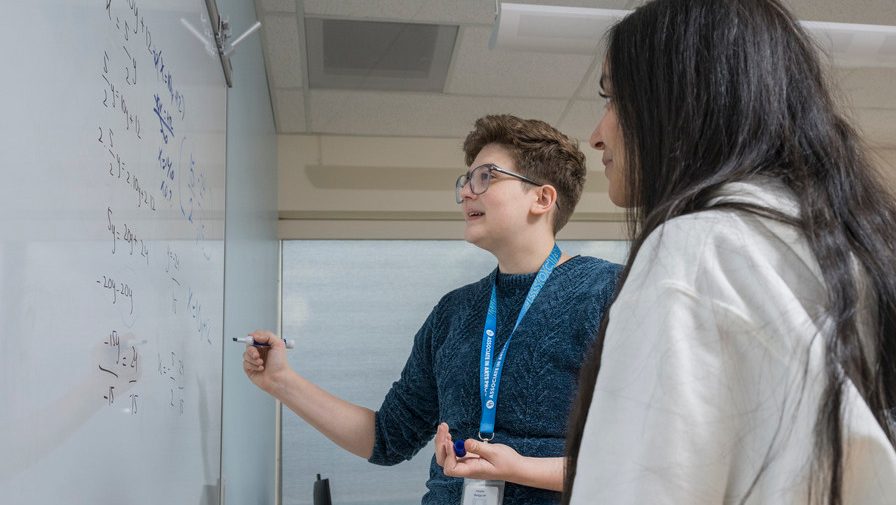
Math 114
Math 114 - Mathematics and Statistics
The information presented here is intended to describe the course goals for current and prospective students as well as others who are interested in our courses. It is not intended to replace the instructional policies and course materials presented in class.
The following information applies to the Newark campus. For information about this course offered at the satellite campuses, see the contacts at the bottom of this web page.
Every effort is made to update this information on a routine basis. However, if you have questions about enrollment, purchasing materials, and prerequisite skills, please check with your advisor or instructor.
The most updated Course Description can be found at the UD Course Description Search. Information on the sections currently offered can be found at the UD Course Search. More information can be found on the departmental syllabus.
Math 114, which fulfills the university mathematics requirement, is designed for liberal arts majors who currently do not intend to take additional courses in mathematics. For several weeks, the course will focus on statistics. Descriptive statistics, the normal distribution, probability, and regression will be studied. The purpose of this unit is to provide the student with an understanding of some of the tools used to analyze data and make informed decisions in the workplace, in research, and in everyday situations. The remainder of the course emphasizes algebra, the application of mathematics, and mathematical modeling. Students will use various functions to model and analyze data. The connections between algebraic and graphical representations of functions and statistical concepts will be stressed throughout the course.
An important goal of this course is to illustrate the importance of mathematics in a variety of fields. Fields such as art, political science, criminology, psychology, and anthropology are just a few examples where mathematics is routinely integrated. Students should be aware that even though they may currently be studying subjects that are not primarily mathematical or statistical, they may encounter these mathematical procedures and ideas in a variety of disciplines or in their career.
Appropriate prerequisite skills and understandings for this course are required for success in this course. Details are discussed in the course prerequisites below. Students who need to review algebra should register for Math 010 Intermediate Algebra.
The following list illustrates the topics intended for coverage in a typical semester. Your instructor may cover these topics in a different order or may add topics if necessary.
Statistics:
- Populations, Samples, and Data
- Random Samples
- Histograms and Frequency Distributions
- Graphs
- Stem and Leaf Displays
- Mode, Median, Mean
- Measures of Variation
- Box-and-Whisker Plots
- Graphs of Normal Probability Distributions
- The Standard Normal Probability Distribution
- Areas Under Any Normal Curve
College Algebra:
- Linear Equations
- Mathematical Modeling
- Linear Inequalities
- Lines in the Plane
- Linear Modelling and Regression
- Functions
- Graphs of Functions
- Quadratic Equations
- Quadratic Formula
- Quadratic Functions and Modeling
- Exponential Functions
- Logarithmic Functions
- Properties of Logarithms
- Solving Exponential and Logarithmic Equations
- Exponential and Logarithmic Modeling
45 or above, or a grade of C- or better in Math 010.
It is assumed that Math 114 students have a basic knowledge of arithmetic and algebra. This includes operations with signed numbers, operations with fractions, basic factoring, operations with polynomials and rational expressions, radicals, working with linear and quadratic functions (including associated equations), and linear inequalities. Students who lack this background should consider changing their enrollment to Math 010 (Intermediate Algebra). Experience has shown those students who enroll without these important algebra skills and understandings will not succeed.
For more information, please see the Math 010 Intermediate Algebra course web site.
Textbooks: A custom textbook that incorporates pertinent sections from the two textbooks listed below – one statistics and one college algebra - is required. Students should wait until the first day of class to ensure the appropriate textbook and other course materials are purchased.
Brase and Brase, Understanding Basic Statistics, Houghton Mifflin.
Larson, Hostetler, Hodgkins, College Algebra: Concepts and Models, Houghton Mifflin.
Calculator Requirement: A graphing calculator is required for this course as it is an important tool for exploring and understanding the mathematical concepts in this course. The homework assignments and exams contain problems that require its use. It is the student's responsibility to have access to a working calculator at all times during the semester for all classes and during all examinations.
Fall/Spring semester: In most cases, during the fall and spring semesters, the course meets three hours per week in either a MWF or Tues/Thur course format. Course enrollments are usually at most 50 students per class with some very small classes during the spring semester. Assessment activities generally include exams, quizzes, group work or other course activities as determined by the instructor. Since this is a multi-section class, usually three common exams and a common cumulative final are administered.
Winter/Summer semester: This course may be offered during the winter and summer sessions. Depending on the session, it may require daily course meetings or a three hour course session once a week.
See Course Sections for sections currently offered.
There are several campus resources that provide additional assistance.
- Mathematical Sciences Learning Laboratory (MSLL) Open Lab: MSLL Open Lab provides free tutorial support for this course. The lab is staffed by qualified undergraduate students. This is a drop-in site – no appointment is needed. Students can work on their math homework, study for a math quiz or exam, and receive free tutorial assistance. More information can be found at the webpage: MSLL Open Lab
- Office of Academic Enrichment: Located at 148-150 South College Avenue, this site provides a number of different course resources for students. Please visit their website for more information.
Students enrolled at other campuses should contact the math faculty for the specific campus for additional information about this course.
- Dover Campus: Brad Thompson, bthompso@udel.edu
- Georgetown Campus: Matthew Willis, mjwillis@udel.edu
- Wilmington Campus: Alexia M intos, amintos@udel.edu


